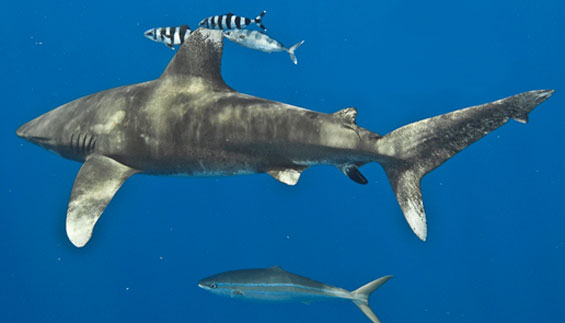Shark fin ban confirmed and timetable tightened
Update 20 August 2014: The government has decided to tighten the timetable further in response to consultation with fisheries stakeholders and the public showing that there was widespread support to implement a ban as quickly as possible.
Update 9 January 2014: The government has decided to ban shark finning and has tightened the timetable in response to 45,300 submissions on the National Plan of Action for the Conservation and Management of Sharks.
The Minister for Primary Industries and the Minister of Conservation launched the National Plan of Action for the Conservation and Management of Sharks (NPOA) 2013.
The purpose of the plan is to maintain the biodiversity and the long-term viability of all New Zealand shark populations by recognising their role in marine ecosystems, ensuring that any utilisation of sharks is sustainable, and that New Zealand receives positive recognition internationally for its efforts in shark conservation and management.
New Zealand has an obligation to produce and periodically review its NPOA-Sharks in line with the United Nations’ Food and Agriculture Organisation’s International Plan of Action for Sharks.
Consultation background
In 2013 feedback was sought on the revised national plan that manages human impacts on sharks: National Plan of Action for the Conservation and Management of Sharks (NPOA Sharks).
New Zealand has a distinctive shark and ray fauna with species occupying a range of different habitats from inshore out to the depths of the continental shelf. About 113 species of shark have been recorded in New Zealand waters.
There are several processes for the protection or management of shark species in New Zealand.
- Seven shark species are fully protected within New Zealand waters under the Wildlife Act 1953: white pointer, whale and basking sharks, oceanic white tipped and deepwater nurse sharks, manta and spine-tailed devil rays.
- White pointer, basking and whale sharks are also listed on international conventions which require parties to work together to protect and manage them.
- Regulations on the trade of a number of shark species are also in place under the Convention on International Trade in Endangered Species (CITES).
A number of other shark species such as school shark, rig or spotted dogfish, blue shark, porbeagle, mako shark, and skates are managed under the fisheries quota management system managed by MPI.
In addition, fishing regulations ban the commercial fishing of basking sharks and bronze whalers in New Zealand.

Oceanic whitetip shark
DOC works with MPI to help conserve sharks in New Zealand through its Conservation Services Programme. This includes working to reduce interactions between protected shark species and fishing vessels as well as contributing to knowledge about protected and threatened sharks and rays.
DOC has worked with MPI, the Ministry of Foreign Affairs and Trade and industry and environment stakeholders to update NPOA Sharks, which was first established in 2008.
This NPOA Sharks stems from the International Plan of Action set up by the Food and Agriculture Organisation of the United Nations.